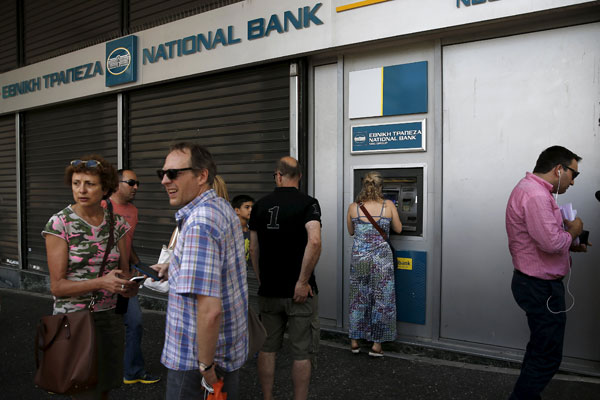Global stocks plunge as Greece imposes controls on money
(Agencies) Updated: 2015-06-29 20:10
 |
|
People line up at an ATM outside a National Bank branch in Athens, Greece June 29, 2015. Greeks woke up to shuttered banks, closed cash machines and a climate of rumours and conspiracy theories on Monday as a breakdown in talks between Athens and its creditors plunged the country deep into crisis.[Photo/Agencies] |
Wall Street was poised for a lower opening, too, with Dow futures and the broader S&P 500 futures down 1.2 percent.
Investors are worried that should Greece leave the euro and write off its debts, which stand at more than 300 billion euros, the global economic recovery could be derailed and questions would grow over the long-term viability of the euro currency itself.
Some say doubts could grow over which country might drop out next from the currency union should it ever get into financial trouble like Greece. On Monday, there were indications that those fears had not grown much, with government bond yields in relatively weak European economies, like Italy's rising only slightly. That's an indication investors do not view Italy's debt as much riskier, despite the events in Greece.
Few think a Greek euro exit would trigger a collapse similar to the one prompted by the demise of U.S. investment bank Lehman Brothers, which in 2008 triggered the worst phase of the global financial crisis. The repercussions are uncertain, however. No country has ever left a currency union as big as the euro before.
Greece will remain the focus of attention throughout the day as the country is due to repay on Tuesday 1.6 billion euros to the International Monetary Fund. Tuesday is also an important day as it marks the end of the country's bailout program. Without an extension or new deal, Greece will not have access to the 7.2 billion euros remaining in its bailout fund and will face the prospect of defaulting on all its future debts, not just the imminent IMF one.
All types of financial markets were affected by the turmoil in Greece. The euro was down 0.5 percent at $1.1100 while a barrel of benchmark crude oil fell $1.32 to $58.31.
The first markets to trade in the wake of the weekend developments were those in Asia and they set the tone. Among the main markets there, the Nikkei 225 stock average in Tokyo slid 2.9 percent to 20,109.95 while the Shanghai Composite Index fell 3.3 percent to 4,053.03 despite China's surprise weekend interest rate cut. Hong Kong's Hang Seng fell 2.6 percent to 25,966.98 and Sydney's S&P/ASX 200 was off 2.2 percent at 5,422.50.
"Developments in Greece have almost completely overshadowed the move by the People's Bank of China to support the equity markets," said Craig Erlam, senior market analyst at OANDA.






